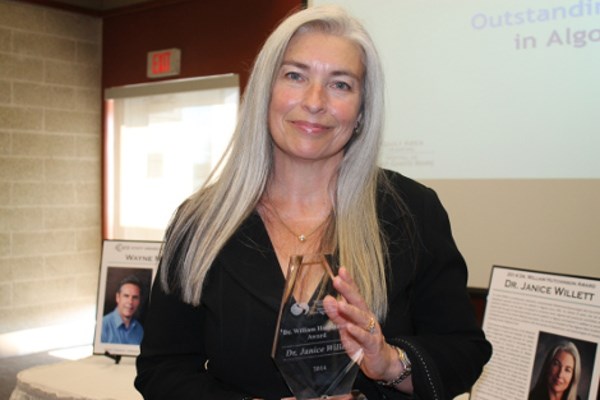A nationally recognized Sault doctor says the hard work being done by so many during the COVID-19 pandemic is inspiring.
“We need to have a shout-out to all our health care workers,” said Dr. Janice Willett.
It’s a list that includes everyone in health care provision, those maintaining the supply chains as well as firemen and policemen who must still respond to their usual calls in the midst of a pandemic.
“This is new uncharted territory . . . they definitely deserve a lot of support,” she said.
The gynecologist/obstetrician received the May Cohen Award for Women Mentors from the Canadian Medical Association in 2018. She was also honoured with the Sault Area Hospital’s Dr. William Hutchinson Award in 2014 and served as president of the Ontario Medical Association in 2007.
Willett, who began her local practice in 1992, is also associate dean of faculty affairs/continuing education and professional development at the Northern Ontario School of Medicine (NOSM).
She’s in the process of winding down her practice and her role at NOSM, but no one expected COVID-19 in the middle of this.
“It’s a big challenge for patients and a big challenge for physicians,” said Dr. Willett.
Some work can be done online, but many medical procedures can’t.
“The group of people I think about are the cancer patients who’ve been put on hold. They have a diagnosis of cancer, but they can’t have surgery . . . I hope that we will find a way of doing some high-priority surgeries, especially the cancer surgeries, sooner rather than later,” she said.
Another group Dr. Willett is thinking about are the NOSM medical students, who’ve had to deal with a major disruption to their education.
“We try to create a sustainable environment for them to get to their next goals,” she said.
This includes on-line learning, meetings and some creative restructuring.
“The residents can’t come together to do exams so they’re going to delay their exams and give them a restricted licence to practice with some supervision by another community physician who is already licenced,” said Dr. Willett.
It’s hard to prepare for something like COVID-19, but NOSM began gearing up for what it would do in February.
“As far as I know, we were the first and perhaps the only medical school that offered our admissions interviews on-line . . . We knew things were changing rapidly. We could anticipate that by looking around the rest of the world.”
The school is also using virtual simulation models to help battle COVID-19. This is aimed at rural and remote family practices where the locums, who sustain these areas, are affected by travel restrictions. The school delivers virtual simulations which show people how to address a COVID-19 patient and intubate them.
“These are tough times. We’ve never experienced this . . . This is way beyond SARS,” said Dr. Willett.
She says you don’t get any do-overs in a situation like this, but in the future, the experience will hopefully lead to a stronger pandemic plan.
“The hospitals and government have been doing a very good job,” said Dr. Willett. “They had to create capacity fast.”
She sees the recovery phase taking a couple of years. “Things will not start up right away,” said Dr. Willett. “We know recovery will be a long time, including the development and implementation of a vaccine.”
Exhausted health care workers will also need time to catch their collective breath.
Developing a vaccine will be the defining point of recovery, but she said it’s also clear we need to ramp up testing now.
Dr. Willett said there’s a definite gap between what’s being tested and reported and the actual number of cases.
This is why she emphasizes the importance of following the distancing rules.
“I don’t want to underestimate the community,” she said. “The people who stay at home and go shopping only once a week . . . As a community we should be proud we are doing our part.”
Those doing their part include the “Good Samaritans” in the community delivering groceries.
When Dr. Willett leaves NOSOM and closes her practice she also hopes to pay it forward as a Good Samaritan.
Her plan is to work with vulnerable women using her skills and knowledge as a gynecologist.
Dr. Willett hopes we get through this peak with as few deaths as possible. We’ll be able to do so as long as everyone does their part.
“We don’t know the full extent of how many infections there are in our community.”
